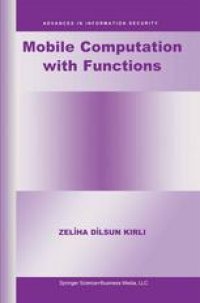
Ebook: Mobile Computation with Functions
Author: Zeliha Dilsun Kirli (auth.)
- Tags: Theory of Computation, Processor Architectures, Programming Languages Compilers Interpreters, Computing Methodologies, The Computing Profession
- Series: Advances in Information Security 5
- Year: 2002
- Publisher: Springer US
- Edition: 1
- Language: English
- pdf
Mobile Computation with Functions explores distributed computation with languages which adopt functions as the main programming abstraction and support code mobility through the mobility of functions between remote sites. It aims to highlight the benefits of using languages of this family in dealing with the challenges of mobile computation. The possibility of exploiting existing static analysis techniques suggests that having functions at the core of mobile code language is a particularly apt choice. A range of problems which have impact on the safety, security and performance are discussed. It is shown that types extended with effects and other annotations can capture a significant amount of information about the dynamic behavior of mobile functions, and offer solutions to the problems under investigation. This book includes a survey of the languages Concurrent ML, Facile and PLAN which inherit the strengths of the functional paradigm in the context of concurrent and distributed computation. The languages which are defined in the subsequent chapters have their roots in these languages.
Mobile Computation with Functions explores distributed computation with languages which adopt functions as the main programming abstraction and support code mobility through the mobility of functions between remote sites. It aims to highlight the benefits of using languages of this family in dealing with the challenges of mobile computation. The possibility of exploiting existing static analysis techniques suggests that having functions at the core of mobile code language is a particularly apt choice. A range of problems which have impact on the safety, security and performance are discussed. It is shown that types extended with effects and other annotations can capture a significant amount of information about the dynamic behavior of mobile functions, and offer solutions to the problems under investigation. This book includes a survey of the languages Concurrent ML, Facile and PLAN which inherit the strengths of the functional paradigm in the context of concurrent and distributed computation. The languages which are defined in the subsequent chapters have their roots in these languages.
Mobile Computation with Functions explores distributed computation with languages which adopt functions as the main programming abstraction and support code mobility through the mobility of functions between remote sites. It aims to highlight the benefits of using languages of this family in dealing with the challenges of mobile computation. The possibility of exploiting existing static analysis techniques suggests that having functions at the core of mobile code language is a particularly apt choice. A range of problems which have impact on the safety, security and performance are discussed. It is shown that types extended with effects and other annotations can capture a significant amount of information about the dynamic behavior of mobile functions, and offer solutions to the problems under investigation. This book includes a survey of the languages Concurrent ML, Facile and PLAN which inherit the strengths of the functional paradigm in the context of concurrent and distributed computation. The languages which are defined in the subsequent chapters have their roots in these languages.
Content:
Front Matter....Pages i-xviii
Towards Mobile Functions....Pages 1-26
Estimating Mobile Values....Pages 27-52
Distributed Call-Tracking....Pages 53-74
Confined Mobile Functions....Pages 75-91
Noninterference and Mobile Functions....Pages 93-111
Conclusions....Pages 113-115
Back Matter....Pages 117-134
Mobile Computation with Functions explores distributed computation with languages which adopt functions as the main programming abstraction and support code mobility through the mobility of functions between remote sites. It aims to highlight the benefits of using languages of this family in dealing with the challenges of mobile computation. The possibility of exploiting existing static analysis techniques suggests that having functions at the core of mobile code language is a particularly apt choice. A range of problems which have impact on the safety, security and performance are discussed. It is shown that types extended with effects and other annotations can capture a significant amount of information about the dynamic behavior of mobile functions, and offer solutions to the problems under investigation. This book includes a survey of the languages Concurrent ML, Facile and PLAN which inherit the strengths of the functional paradigm in the context of concurrent and distributed computation. The languages which are defined in the subsequent chapters have their roots in these languages.
Content:
Front Matter....Pages i-xviii
Towards Mobile Functions....Pages 1-26
Estimating Mobile Values....Pages 27-52
Distributed Call-Tracking....Pages 53-74
Confined Mobile Functions....Pages 75-91
Noninterference and Mobile Functions....Pages 93-111
Conclusions....Pages 113-115
Back Matter....Pages 117-134
....